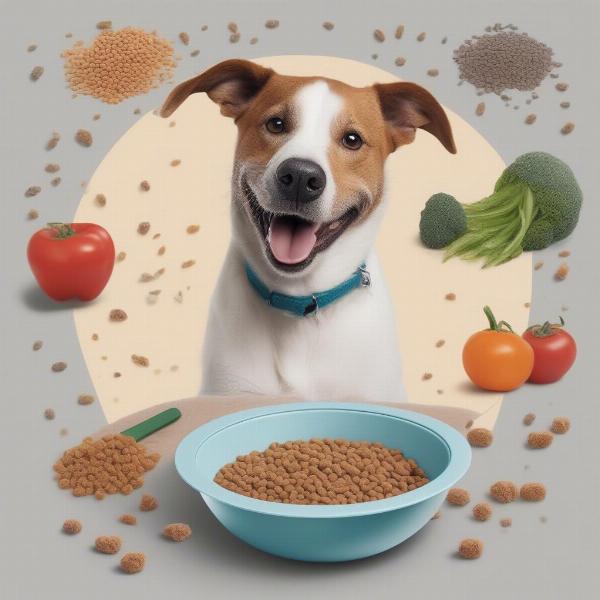Fibre plays a crucial role in a dog’s digestive health, contributing to regular bowel movements, and even influencing their overall well-being. For dog owners in the UK, understanding the importance of fibre and how to incorporate it appropriately into their dog’s diet is essential. This guide will explore the benefits of fibre for dogs, the different types available, and how to choose the right fibre supplement for your canine companion in the UK.
 Dog eating high fibre food
Dog eating high fibre food
Why is Fibre Important for Dogs?
Fibre, often referred to as roughage, is the indigestible part of plant-based foods. While it doesn’t provide direct nutrients, it plays a vital role in maintaining a healthy digestive system. For dogs experiencing constipation, fibre can add bulk to the stool, making it easier to pass. Conversely, for dogs with diarrhoea, certain types of fibre can absorb excess water, helping to firm up the stool.
Benefits of Fibre for Dogs in the UK
- Regulates bowel movements: Fibre helps manage both constipation and diarrhoea, promoting healthy and regular bowel movements.
- Promotes weight management: Fibre can create a feeling of fullness, which can help prevent overeating and contribute to a healthy weight.
- Supports gut health: Fibre nourishes beneficial bacteria in the gut, contributing to a healthy microbiome.
- Manages blood sugar levels: Soluble fibre can help regulate blood sugar levels, which is particularly important for dogs with diabetes.
- Helps with anal gland issues: Adequate fibre intake can help prevent anal gland problems by promoting regular and firm stools.
Types of Fibre for Dogs
There are two main types of fibre: soluble and insoluble. Both are beneficial but work in different ways.
- Soluble Fibre: This type dissolves in water, forming a gel-like substance. It helps regulate blood sugar levels and can be beneficial for dogs with diarrhoea. Sources include beet pulp, oats, and apples.
- Insoluble Fibre: This type does not dissolve in water and adds bulk to the stool, aiding in constipation relief. Sources include wheat bran, vegetables, and whole grains.
Choosing the Right Fibre Supplement in the UK
A variety of dog fibre supplement are available in the UK, ranging from powders to chews. When choosing a supplement, consider your dog’s individual needs, such as their age, breed, and specific digestive issues.
“Choosing the correct fibre supplement is crucial. Always consult with your vet to determine the best option for your dog’s specific needs,” advises Dr. Emily Carter, a veterinary nutritionist based in London.
Adding Fibre to Your Dog’s Diet
If your dog needs additional fibre, there are several ways to incorporate it into their diet.
- High-Fibre Dog Food: Consider switching to a high fibre dog food. Many brands offer formulas specifically designed for digestive health. Look for options with ingredients like beet pulp, brown rice, and pumpkin.
- Fibre Supplements: As mentioned earlier, various dog food supplements uk are available. Follow the dosage instructions carefully.
- Adding Fibre-Rich Foods: You can add small amounts of fibre-rich foods to your dog’s existing diet, such as cooked pumpkin, sweet potato, or carrots. Always introduce new foods gradually to avoid upsetting their stomach. For puppies, consider the best wet dog food for puppies uk with added fibre.
Conclusion
Fibre is a crucial component of a healthy dog diet. By understanding the different types of fibre and how they benefit your dog, you can ensure their digestive system is functioning optimally. If you are considering adding fibre supplements to your dog’s diet, consult with your veterinarian in the UK to determine the best approach and dosage.
FAQ
- How much fibre does my dog need? The amount of fibre a dog needs varies depending on their size, breed, and overall health. Consult your vet for specific recommendations.
- Can too much fibre be harmful to my dog? Yes, excessive fibre can lead to digestive upset, gas, and bloating. Always follow the recommended dosage for any fibre supplement.
- What are the signs of fibre deficiency in dogs? Signs can include constipation, diarrhoea, and difficulty passing stool.
- What are some good sources of fibre for senior dog food uk? Pumpkin, sweet potato, and beet pulp are good sources of fibre for senior dogs.
- Are there any side effects of fibre supplements? Some dogs may experience mild gas or bloating when first starting a fibre supplement.
About ILM Dog
ILM Dog is your trusted resource for expert dog care advice. We offer a wealth of information on dog breeds, health, training, nutrition, grooming, and much more. Our team of experts is dedicated to providing dog owners with the knowledge and resources they need to provide the best possible care for their canine companions. From selecting the right breed to understanding nutritional needs, ILM Dog covers all aspects of responsible dog ownership. Contact us today for expert advice! Email: [email protected], Phone: +44 20-3965-8624.